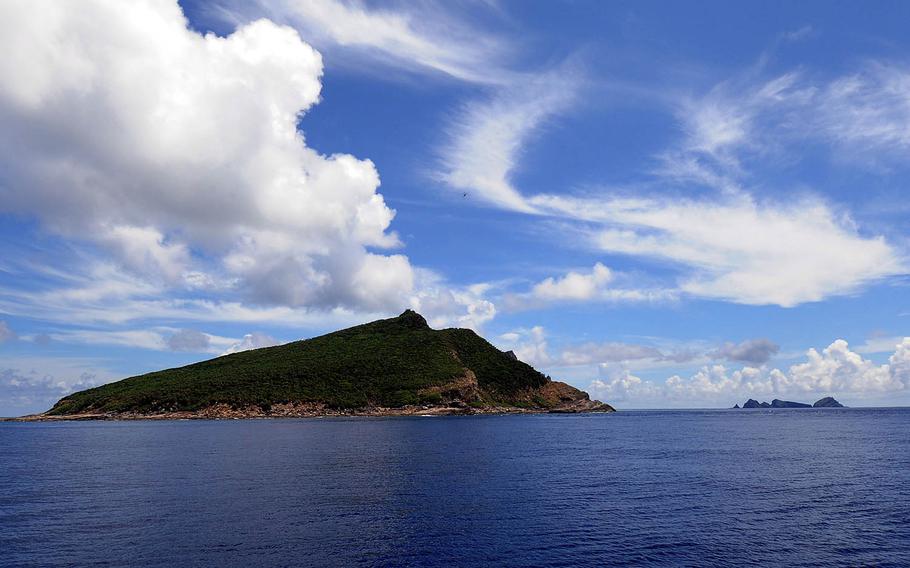Asia-Pacific
Japan Coast Guard may fire at foreign vessels attempting to land on Senkakus, government says
Stars and Stripes February 26, 2021

The Senkaku islands in the East China Sea are administered by Japan but also claimed by China and Taiwan. (Cabinet Secretariat of Japan)
TOKYO — Japan on Friday matched a move by rival China and will permit its coast guard to fire on foreign vessels attempting to land on the Senkakus, two square miles of uninhabited islands in the East China Sea.
The two countries’ coast guards regularly face off around the chain as Chinese vessels arrive to shadow or intimidate Japanese fishing vessels and Japan’s coast guard arrives to drive them away. Japan controls the islands, although Taiwan and China, which calls them Diaoyu Dao, also make claims.
The Japan Constitution generally forbids offensive military action; however, the Police Official Duties Execution Act, which applies to the nation’s coast guard, may allow ships to fire on foreign vessels to prevent a “heinous crime,” including an attempt to land at the Senkakus, Chief Cabinet Secretary Katsunobu Kato said at a press conference Friday. A heinous crime is an offense that carries a penalty of death or more than three years in prison, he said.
The islands lie 30 nautical miles west of Okinawa. They constitute another choke point for Chinese vessels steaming east, occupy a rich fishing ground and may sit atop fossil fuel reserves.
This is the first time the Japanese government has clearly stated that its coast guard may fire on vessels attempting to land on Japanese soil, Taku Otsuka, head of the ruling Liberal Democratic Party’s National Defense Division, told Stars and Stripes by phone Friday.
Otsuka said party members have strongly urged the government to take measures against Chinese coast guard vessels entering Japanese waters or chasing its fishing boats. The incidents go back about five years. Most recently, several Chinese vessels entered coastal waters around the Senkakus on Feb. 20, according to Japanese media accounts.
Otsuka said Japanese government officials clarified the policy to members of the LDP National Defense Division on Thursday.
Japanese government officials have previously said the coast guard could fire on foreign vessels only in self-defense or for emergency escape, according to a Friday report by Japan Today. Article 9 of Japan’s Constitution bans offensive attack, but defensive force is allowed.
The LDP reinforced its call after Feb. 1, when China enacted a law allowing its coast guard to use military force against vessels in waters claimed by Beijing, including those surrounding the Senkakus.
Since then, Chinese coast guard vessels have appeared in the area at least once a week, up from a previous average of one visit per month, Otsuka said.
“It is clearly a violation of sovereign power,” he said.
Last year, Japan spotted Chinese-flagged vessels of various types near the Senkakus a record 333 times, besting the previous year’s record of 282, according to the Japan Coast Guard website.
Chinese Foreign Ministry spokesman Wang Wengbin in a Feb. 8 press conference said Beijing is within its rights to steam through the waters, calling the islands “inherent Chinese territory,” according to a translated transcript.
“The patrol and law enforcement activities by China Coast Guard in these waters are legitimate and lawful measures to safeguard sovereignty,” he said.
Pentagon spokesman John Kirby in a press conference Tuesday urged China to “avoid actions using their coast guard vessels that could lead to miscalculation and potential physical … and material harm,” according to a transcript on the Defense Department website. “We support Japan obviously in that sovereignty,” he said.
On Friday, the press secretary apologized for any confusion caused over those words — an apparent reference to Washington’s neutral position on who holds authority over the islands.
“There is no change to U.S. policy regarding the sovereignty of the Senkaku Islands,” said an editor’s note added Friday to the transcript of Tuesday’s press briefing. Since the Obama administration, the U.S. has held that the U.S.-Japan security treaty applies to the Senkakus, meaning the U.S. military would come to Japan’s defense if the islands were attacked. Defense Secretary Lloyd Austin reaffirmed that policy for the Biden administration on Jan. 23, according to the Pentagon. “The department is committed to defending the free and open rules-based international order an order from which the U.S., our allies and partners and even the People's Republic of China has enjoyed great benefit,” Kirby said Tuesday, “but which Beijing, through its actions, is undermining for its own interests.”
doornbos.caitlin@stripes.com Twitter: @CaitlinDoornbos
kusumoto.hana@stripes.com Twitter: @HanaKusumoto